Request Letter For Permission
[Your Name]
[Your Address]
[City, State, Zip Code]
[Email Address]
[Phone Number]
[Date]
[Recipient's Name]
[Recipient's Designation]
[Organization/Institution Name]
[Address]
[City, State, Zip Code]
Subject: Request for Permission
Dear [Recipient's Name],
I hope this letter finds you well. I am writing to formally request permission for [state the purpose of the request]. I am [briefly introduce yourself and your position or affiliation if applicable].
The purpose of this request is [provide a clear and concise explanation of the reason for seeking permission]. I believe that [explain the potential benefits or outcomes of the proposed activity].
I assure you that the proposed activity will be conducted with utmost responsibility and will comply with all relevant rules, regulations, and guidelines set forth by your organization or any applicable governing bodies.
To ensure transparency, I am willing to provide any additional information or documentation you may require to process this request.
The proposed timeline for the activity is as follows:
- Start Date: [date]
- End Date: [date]
If you grant the permission, I will ensure that any specific requirements or conditions laid out by your organization will be strictly adhered to.
Please find attached any supporting documents or relevant information that may aid in evaluating this request.
I kindly request you to consider this application for permission and grant your approval at your earliest convenience. Your cooperation and support in this matter are highly appreciated.
Thank you for your time and consideration. Should you have any questions or require further details, please do not hesitate to contact me via email at [[email protected]] or by phone at [your phone number].
Looking forward to a positive response.
Sincerely,
[Your Name]
[Your Signature if a physical letter]
[Enclosures if applicable]
Permission to Leave Work Early - Professional Email
Subject: Request for Early Departure on [Date]
Dear [Supervisor's Name],
I am writing to request permission to leave work early on [specific date] at [time]. Due to [brief reason - medical appointment/family emergency/personal matter], I need to depart by [time] instead of my regular [time].
I have arranged for [colleague's name] to handle any urgent matters that may arise in my absence, and I will ensure all pending tasks are completed before leaving. I am also available via phone/email if any critical issues require immediate attention.
I understand this may cause some inconvenience and apologize for any disruption to the team's workflow. I will make up for the lost time by [coming in early the next day/working through lunch/staying late another day].
Please let me know if this arrangement is acceptable or if you need any additional information.
Thank you for your understanding and consideration.
Best regards,
[Your Name]
[Your Position]
[Contact Information]
Student Permission for Field Trip - Formal Letter
Subject: Permission Request for Educational Field Trip
Dear [Principal/Teacher's Name],
I am writing to request permission for my child, [Student's Name], who is currently enrolled in [Grade/Class], to participate in the upcoming educational field trip to [Destination] scheduled for [Date].
I understand that this trip is designed to enhance [subject] learning and provide hands-on educational experiences that complement classroom instruction. After reviewing the itinerary and safety measures outlined in the information packet, I am confident this will be a valuable learning opportunity.
I hereby grant permission for my child to participate in all scheduled activities including transportation via [bus/other transport]. I have completed and attached the required medical information form and emergency contact details.
In case of emergency, I can be reached at [primary phone number] or [alternate contact]. I also authorize school personnel to seek immediate medical attention if required.
Please find enclosed the signed permission slip and the participation fee of [amount].
Thank you for organizing this enriching educational experience.
Sincerely,
[Parent's Name]
[Relationship to Student]
[Date]
Event Venue Permission - Formal Business Letter
Subject: Request for Venue Usage Permission - [Event Name]
Dear [Venue Manager/Authority],
I am writing on behalf of [Organization Name] to formally request permission to use [Venue Name] for our upcoming [type of event] scheduled for [Date] from [start time] to [end time].
Our event, [Event Name], is a [brief description of event purpose] expecting approximately [number] attendees. We have carefully reviewed your venue guidelines and ensure our event complies with all regulations including capacity limits, safety requirements, and noise restrictions.
We are prepared to fulfill all necessary requirements including:
- Payment of venue rental fees
- Provision of adequate insurance coverage
- Compliance with security and safety protocols
- Cleanup responsibilities post-event
Our organization has a strong track record of responsible event management, and we guarantee that your facility will be treated with utmost respect and care. References from previous venues can be provided upon request.
I would appreciate the opportunity to discuss rental terms, available dates, and any additional requirements. Please let me know your availability for a brief meeting or phone call.
Thank you for considering our request. I look forward to your positive response.
Professionally yours,
[Your Name]
[Title]
[Organization Name]
[Contact Details]
Medical Leave Permission - Compassionate Email
Subject: Medical Leave Request - [Your Name]
Dear [HR Manager/Supervisor],
I hope this message finds you well. I am writing to formally request medical leave from my position as [job title] due to [general health condition - avoid specific details].
My healthcare provider has advised a period of rest and recovery lasting approximately [duration]. I have attached the medical certificate confirming the necessity of this leave period.
During my absence, I have arranged for [colleague's name] to handle my immediate responsibilities and have prepared detailed handover notes for all ongoing projects. I will ensure a smooth transition before my leave begins on [start date].
I understand the challenges my absence may create for the team and sincerely apologize for any inconvenience. I am committed to making this transition as seamless as possible and am available for any urgent clarifications via email during the first week of my leave.
I anticipate returning to work on [expected return date] and will provide regular updates on my recovery progress as appropriate. Please let me know if you need any additional documentation or if there are specific procedures I should follow.
Thank you for your understanding and support during this challenging time.
Warm regards,
[Your Name]
[Employee ID]
[Department]
Research Access Permission - Academic Formal Letter
Subject: Request for Research Access Permission
Dear [Research Director/Department Head],
I am [Your Name], a [degree level] student at [University Name] conducting research for my [thesis/dissertation/project] titled "[Research Title]" under the supervision of [Supervisor's Name].
I am writing to request permission to access [specific resources/facilities/data/archives] at your [institution/organization] for my research on [brief research topic]. This research aims to [main objective] and will contribute valuable insights to [field of study].
My research has been approved by the [University Ethics Committee/IRB] and all ethical guidelines will be strictly followed. I have attached:
- Research proposal summary
- Ethics approval letter
- Letter of recommendation from my supervisor
- Proof of student enrollment
I require access for approximately [duration] beginning [start date]. I am flexible with scheduling and can work around your facility's operational requirements. All findings will be shared with your organization upon completion, and proper attribution will be given in any publications.
I would be grateful for the opportunity to discuss my research in detail and address any questions or concerns you may have. Your support would be invaluable to the success of this research project.
Thank you for your time and consideration.
Respectfully yours,
[Your Name]
[Academic Title/Year]
[University Name]
[Contact Information]
Property Renovation Permission - Neighborly Letter
Subject: Notification of Upcoming Home Renovation
Dear Neighbors,
I hope you are all doing well. I am writing to inform you about upcoming renovation work at my property located at [Address] and to request your understanding and patience during this period.
Starting [Date], I will be undertaking [type of renovation - kitchen remodel/roof repair/addition] which is expected to last approximately [duration]. The work will generally take place between [hours] on [days of week] to minimize disruption to your daily routines.
While I have chosen contractors known for their professionalism and consideration, some noise and temporary inconvenience is inevitable. I want to assure you that:
- All work will comply with local noise ordinances
- Construction vehicles will be parked considerately
- Debris will be properly contained and removed regularly
- Any damage to shared spaces will be promptly addressed
I genuinely appreciate your patience and understanding during this time. Home improvements benefit our entire neighborhood, and I am committed to completing this project with minimal impact on our community.
If you have any specific concerns or if the work becomes particularly disruptive, please don't hesitate to contact me at [phone number]. I am happy to discuss any issues and find solutions that work for everyone.
Thank you for being such wonderful neighbors.
Best wishes,
[Your Name]
[Your Address]
[Contact Information]
Photography Permission - Creative Email
Subject: Permission Request for Photography Session
Hello [Property Owner/Manager],
Greetings! I'm [Your Name], a [professional photographer/photography student] reaching out with an exciting opportunity that I believe could be mutually beneficial.
I'm currently working on a photography project focused on [theme/subject] and would love to request permission to photograph at your beautiful [location/property]. Your [specific feature - architecture/gardens/unique elements] would provide the perfect backdrop for capturing [artistic vision].
The shoot would involve:
- Duration: Approximately [hours] on [proposed dates]
- Equipment: Professional cameras and minimal lighting equipment
- Participants: Myself and [number] assistants/models
- Area: Primarily [specific locations within property]
I want to assure you that we operate with complete professionalism and respect. All participants carry liability insurance, and we guarantee to leave the space exactly as we found it. No alterations or modifications to your property would be made.
In exchange for this opportunity, I would be happy to provide you with high-quality images of your property for your own marketing or personal use. These photos often prove valuable for websites, brochures, or social media presence.
I'd love to discuss this opportunity further and address any questions or concerns you might have. Perhaps we could arrange a brief meeting so you can get to know me and my work better?
Thank you for considering this creative collaboration!
Enthusiastically yours,
[Your Name]
[Photography Business/Portfolio Website]
[Contact Information]
What is a Permission Request Letter and Why is it Important
A permission request letter is a formal or semi-formal document used to seek authorization, approval, or consent from an individual, organization, or authority before proceeding with a specific action or activity. These letters serve as legal safeguards, demonstrate respect for others' rights and property, and establish clear communication channels between parties.
The primary purposes include:
- Obtaining legal authorization for activities that affect others
- Demonstrating professionalism and courtesy
- Creating written documentation of approval
- Establishing clear expectations and boundaries
- Avoiding potential conflicts or legal issues
- Building positive relationships through transparent communication
Who Should Write Permission Request Letters
Permission request letters should be written by:
- Employees seeking workplace accommodations or time off
- Students requiring academic or extracurricular permissions
- Parents authorizing children's participation in activities
- Researchers needing access to facilities or data
- Event organizers seeking venue approvals
- Contractors planning construction or renovation work
- Artists and photographers requiring location access
- Business owners requesting partnerships or collaborations
- Individuals planning activities that may impact others
- Organizations seeking endorsements or sponsorships
When Permission Request Letters are Required
These letters become necessary in various scenarios:
- Before taking extended leave from work or school
- When planning events on public or private property
- Prior to conducting research involving human subjects or restricted materials
- Before making property modifications that affect neighbors
- When organizing activities involving minors
- Prior to using copyrighted materials or intellectual property
- Before conducting photography or filming on private property
- When requesting access to restricted facilities or archives
- Prior to organizing fundraising or promotional activities
- Before implementing changes that affect multiple stakeholders
How to Write and Send Effective Permission Letters
The process involves several key steps:
- Research the appropriate recipient and their preferred communication method
- Gather all necessary supporting documentation
- Choose the appropriate tone and format based on the relationship and context
- Clearly state your request in the opening paragraph
- Provide detailed information about what you're requesting and why
- Address potential concerns proactively
- Offer solutions or compromises when possible
- Include relevant attachments or supporting materials
- Proofread carefully for professionalism and clarity
- Send through the appropriate channels (email, postal mail, or in-person delivery)
- Follow up appropriately if no response is received within reasonable timeframes
Requirements and Prerequisites Before Sending
Before writing your permission request letter, ensure you have:
- Clear understanding of what you're requesting and why
- Knowledge of relevant policies, procedures, or regulations
- Supporting documentation (certificates, references, insurance proof)
- Specific dates, times, and duration details
- Contact information for all relevant parties
- Understanding of potential costs or fees involved
- Backup plans or alternative arrangements if permission is denied
- Legal clearance if the request involves complex regulations
- Team coordination if multiple people are involved
- Budget approval for any associated expenses
Essential Elements and Structure of Permission Letters
Every effective permission letter should include:
- Clear, descriptive subject line (for emails) or title
- Appropriate salutation addressing the correct person
- Opening paragraph stating the specific request
- Detailed explanation of the purpose and scope
- Timeline and duration information
- Acknowledgment of potential concerns or impacts
- Proposed solutions or mitigation measures
- Relevant attachments or supporting documents
- Professional closing and contact information
- Signature (for printed letters) or electronic signature
- Date and reference numbers when applicable
Professional Formatting and Style Guidelines
Format considerations include:
- Length should typically be one to two pages maximum
- Use professional business letter format for formal requests
- Email format is acceptable for routine workplace requests
- Tone should match the relationship and context (formal, professional, friendly)
- Language should be clear, concise, and respectful
- Avoid overly technical jargon unless necessary
- Use active voice and positive phrasing
- Include proper spacing and margins for readability
- Choose appropriate font and size for printed letters
- Ensure all contact information is current and complete
Follow-up Actions After Sending Your Request
After sending your permission letter:
- Note the date sent and method of delivery
- Set calendar reminders for follow-up if needed
- Prepare to provide additional information if requested
- Be flexible with meeting requests or clarification calls
- Maintain professional communication throughout the process
- Document any verbal approvals in writing
- Confirm receipt of written permissions
- File approved permissions securely for future reference
- Begin necessary preparations once permission is granted
- Send thank-you notes acknowledging cooperation
- Honor all commitments made in your original request
Common Mistakes to Avoid When Requesting Permission
Frequent pitfalls include:
- Waiting until the last minute to make requests
- Being vague about specific needs or requirements
- Failing to research proper procedures or contacts
- Not providing adequate justification for the request
- Ignoring potential negative impacts on others
- Making demands rather than polite requests
- Forgetting to include essential supporting documentation
- Using inappropriate tone or overly casual language
- Not offering solutions to potential problems
- Failing to follow up appropriately
- Making assumptions about automatic approval
- Not reading response communications carefully
Advantages and Disadvantages of Written Permission Requests
Benefits include:
- Creates official documentation and paper trail
- Demonstrates professionalism and respect
- Allows careful consideration of language and tone
- Provides opportunity to include detailed supporting information
- Establishes clear expectations and boundaries
- Reduces misunderstandings through written communication
Potential drawbacks:
- May seem overly formal for simple requests
- Takes more time than verbal communication
- Can create delays in urgent situations
- May be lost or overlooked in busy environments
- Requires more effort to prepare properly
- Can seem impersonal compared to face-to-face requests
Tips and Best Practices for Success
Maximize your chances of approval by:
- Researching the recipient's priorities and concerns
- Timing your request appropriately
- Offering multiple options or alternatives
- Providing references from previous similar situations
- Being completely honest about your needs and limitations
- Showing flexibility and willingness to accommodate concerns
- Following up with gratitude regardless of the outcome
- Building relationships before you need permissions
- Keeping requests concise but comprehensive
- Using positive language that focuses on benefits
- Proofreading everything multiple times before sending

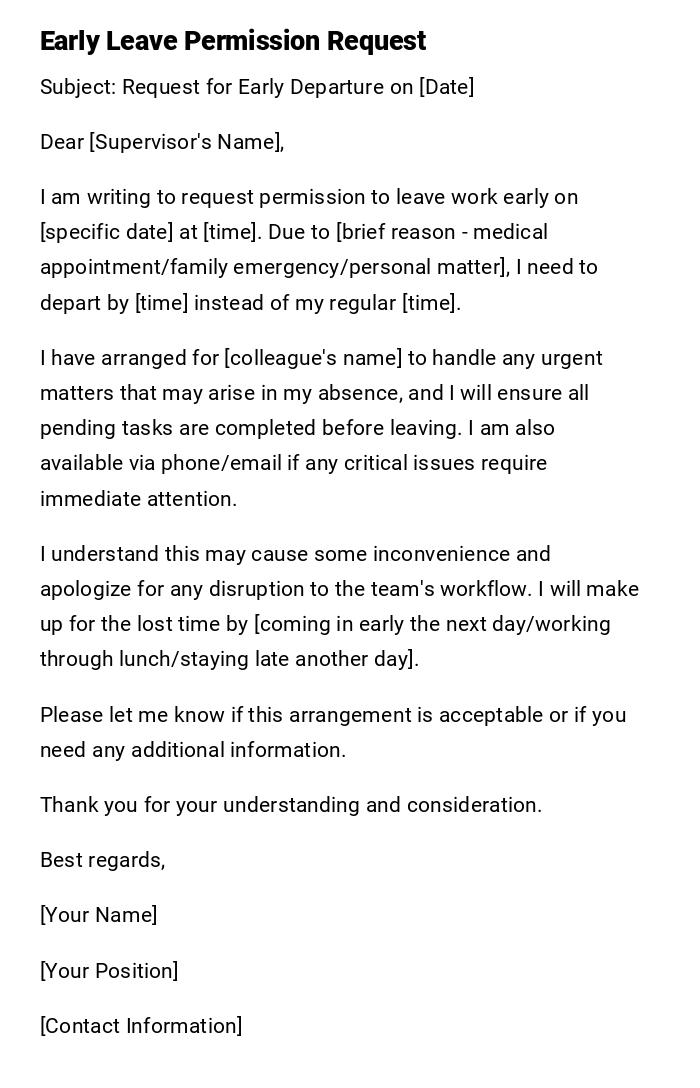
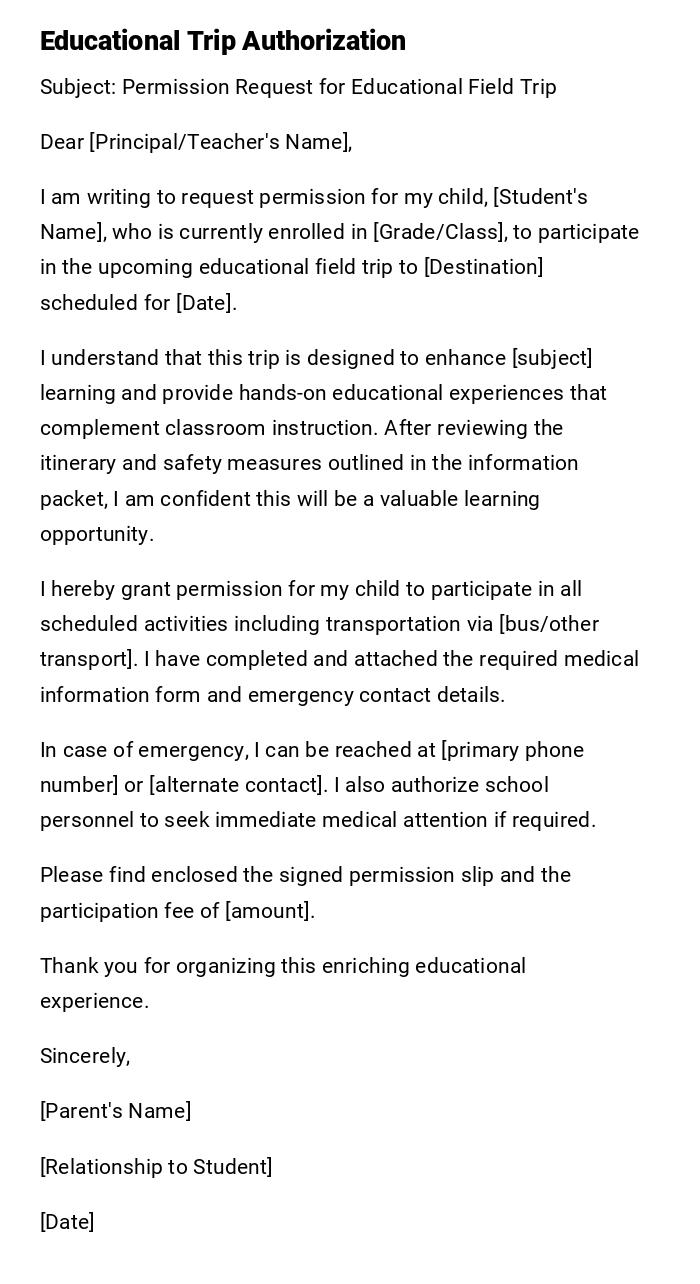
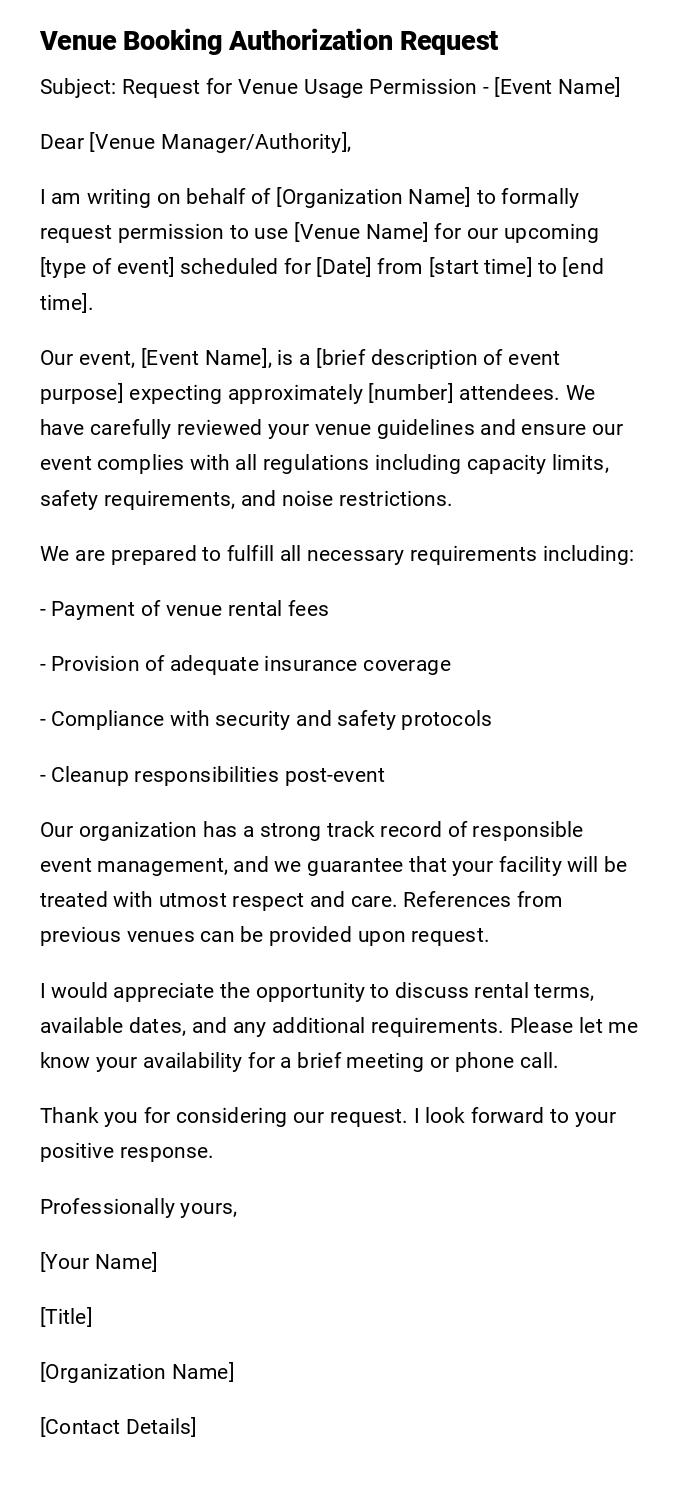
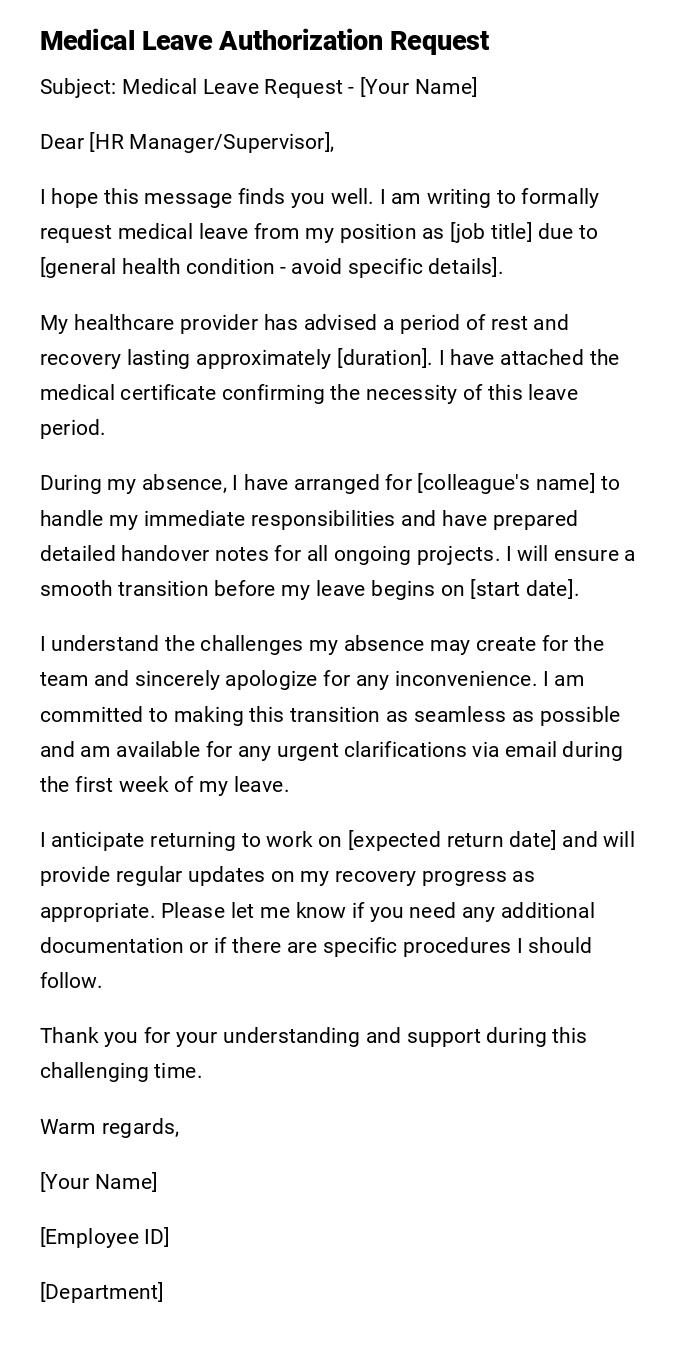
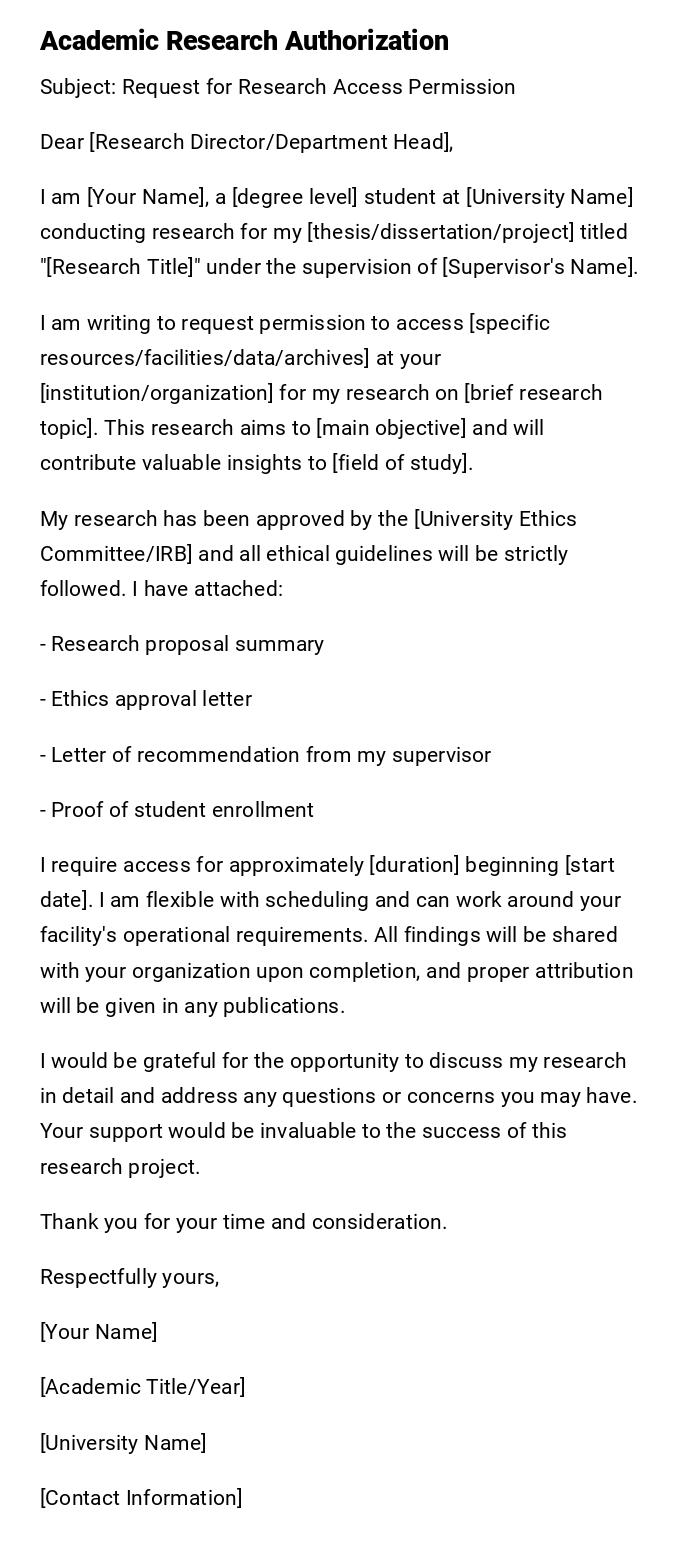
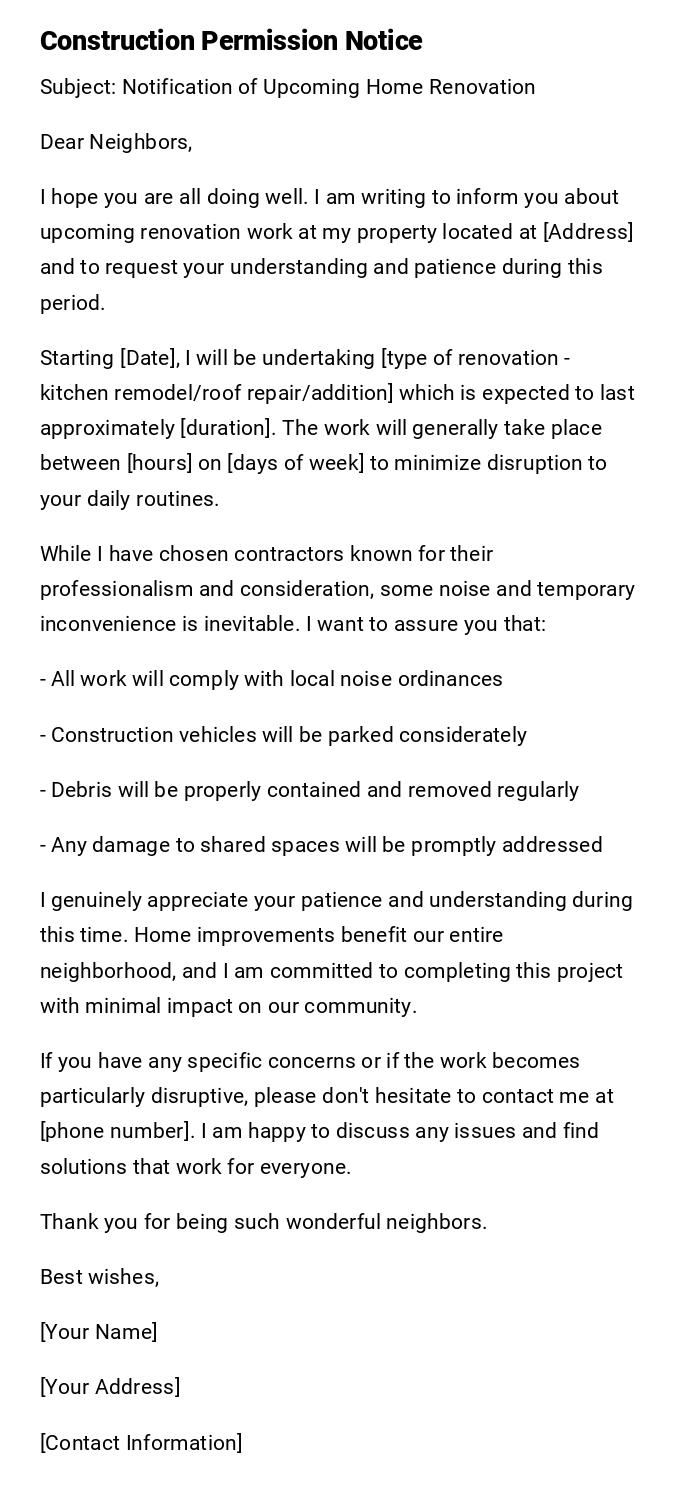
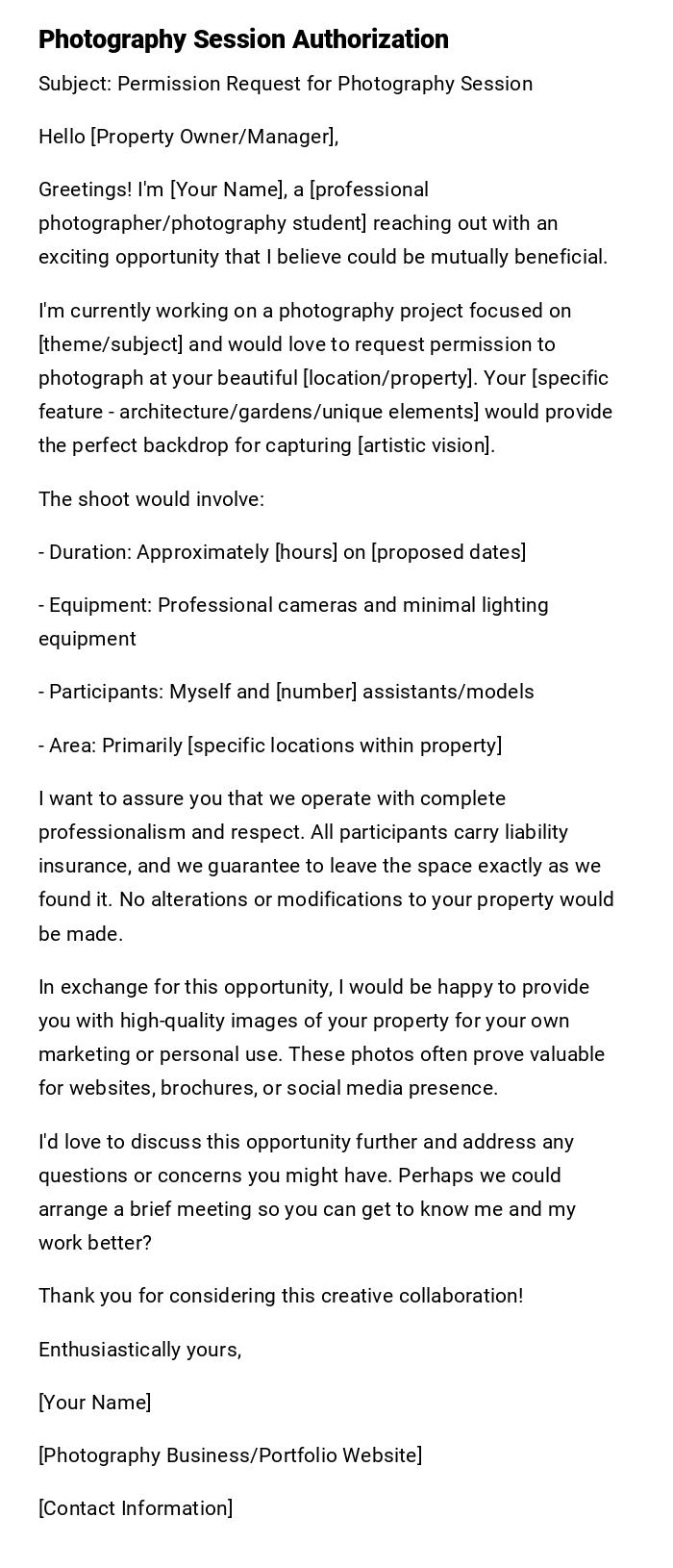

 Download Word Doc
Download Word Doc
 Download PDF
Download PDF